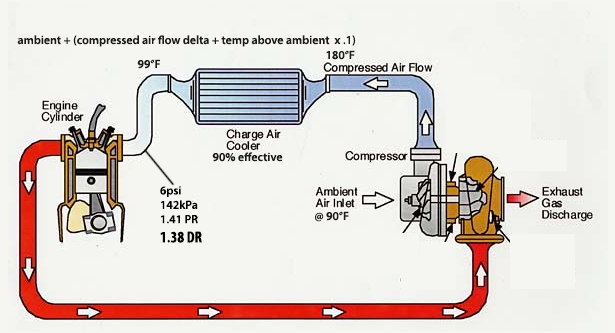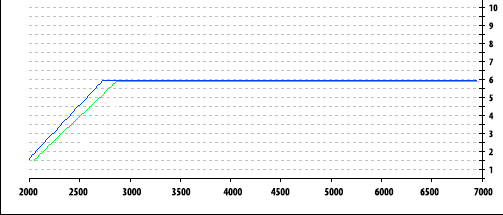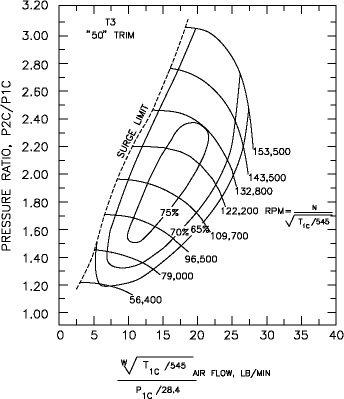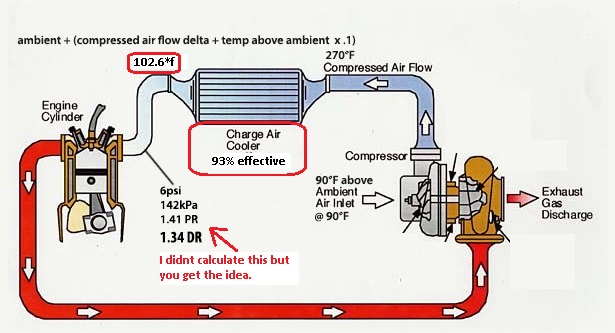Is cold air intake necessary on a turboed car?
#41
you're ignoring a lot more than i am. and yes, you really lost track of your units, conversions, and relevance there.
here, this one factors in most:
Not2Fast: Turbo Calculator
it agrees that the change from 26.6*C to 82*C intake temps doesn't change the HP significantly once you input the rest.
here, this one factors in most:
Not2Fast: Turbo Calculator
it agrees that the change from 26.6*C to 82*C intake temps doesn't change the HP significantly once you input the rest.
What where did I loose track of units, conversions or relevance? I didn't check my math, but since you say it's wrong, what is wrong?
#42
If I'm wrong, and I may very well be wrong, please explain/demonstrate. I am not perfect! All I did was lookup the density online and work some maths with a calculator. Do you think I did it wrong, or do you know I did it wrong? If you know, what did I miss?
#46
Pat I think you're math is good. But I really really ******* hate doing fluids or thermodynamics work in imperial units. My step 1 when doing it with them on paper is to convert to metric because I've been burned by a weird unit conversion before. Its why I like mathcad so much, you can give your inputs units and it'll handle all the units conversion for you and tell you if theres a units mismatch.
#47
Boost Czar


iTrader: (62)
Join Date: May 2005
Location: Chantilly, VA
Posts: 79,488
Total Cats: 4,077
The losses at the engine are fairly low in my scenario--you're ignoring the DR completely and focusing at airspeed at the intake.
remove the intake altogether.
I'm suggesting on same day, with just different intake temps you might only lose 3% power from doubling the intake temps. You're still taking all that less dense air, then packing it back together after the intercooler, just not QUITE as well [3% less effective] because it's slightly warmer and more energized.


Losses of turbo efficiency might skew the numbers slightly, but that's going to be seen as slower boost threshold. Like how you can overboost on a cold day and underboost on a warm one, if using a MBC. Sure, you'll make more power on that colder day because the temps are lower and you're packing more air per volume. But the DR represents how effective your PR is. In a perfect world PR = DR.
To make up for the loses when it's hot, you spin the turbo a little more. The airflow on the turbo compressor map doesn't change but the speed/PR at the compressor outlet will increase to make up for it. Basically it just takes a little longer to make the boost pressure.

I may be oversimplifying it, but I think you're over-complicating it.
the intake temps may have doubled, but the IC being so effective brings the gains of 38% more oxygen to burn per volume down to 34%.
If it was a 40°F day, and still 180°F intake temps, then yeah the loss will be more significant for sure, would be nice to know what intake temps on an n/a miata typically reach using a WAI. But even here that's 63°F intake temps from a WAI after IC vs. 49°F on the CAI--that's still 1.385DR vs. 1.348DR--so it doesn't really appear so.
remove the intake altogether.
I'm suggesting on same day, with just different intake temps you might only lose 3% power from doubling the intake temps. You're still taking all that less dense air, then packing it back together after the intercooler, just not QUITE as well [3% less effective] because it's slightly warmer and more energized.


Losses of turbo efficiency might skew the numbers slightly, but that's going to be seen as slower boost threshold. Like how you can overboost on a cold day and underboost on a warm one, if using a MBC. Sure, you'll make more power on that colder day because the temps are lower and you're packing more air per volume. But the DR represents how effective your PR is. In a perfect world PR = DR.
To make up for the loses when it's hot, you spin the turbo a little more. The airflow on the turbo compressor map doesn't change but the speed/PR at the compressor outlet will increase to make up for it. Basically it just takes a little longer to make the boost pressure.

I may be oversimplifying it, but I think you're over-complicating it.
the intake temps may have doubled, but the IC being so effective brings the gains of 38% more oxygen to burn per volume down to 34%.
If it was a 40°F day, and still 180°F intake temps, then yeah the loss will be more significant for sure, would be nice to know what intake temps on an n/a miata typically reach using a WAI. But even here that's 63°F intake temps from a WAI after IC vs. 49°F on the CAI--that's still 1.385DR vs. 1.348DR--so it doesn't really appear so.
Last edited by Braineack; 03-15-2015 at 01:33 PM.
#48
You are only looking at temps and PR's after the compressor, I was only looking at temps and PR's before the compressor. We're both "right" on those numbers. Your numbers show that the intercooler works to fix the density ratio, my numbers show that a restriction upstream of the turbo is very bad.
The point I was trying to make was that only looking at one number (temp, pressure, doesn't matter) doesn't give you the whole picture.
So making a statement that inlet temps are trivial, intercooler is key is wrong. There is more to it than that. We both know boost is a measure of restriction, that is important here! Your statement about "Losses of turbo efficiency might skew the numbers slightly" should be "will skew the numbers". It will. Anyone wanting to test this, go put a restrictor on the inlet of your turbo, or in the intercooler pipe, or in the downpipe, and report back. Air flows through the entire system, changing anything in the system will affect HP.
We're actually both oversimplifying it to be honest. We have not touched on what's happening at the turbine.
The whole point of my post was to show
1. As a system, changing one thing does change several things.
2. Some of the things that change are more important regarding HP than others.
I believe my post explains these two points, and that's all it was supposed to do. As I said, I don't have the software to model EVERYTHING that would be required to accurately calculate how much it would change hp.
But I do in fact have real world experience on this exact topic, and have done same day testing on this (hot air intake vs cold air intake) on a high boost turbo miata and confirmed that the SYSTEM flows more air through the engine with a cold air intake at THE SAME BOOST PRESSURE. So much so that I had to retune my fuel as the engine went lean with a CAI.
The point I was trying to make was that only looking at one number (temp, pressure, doesn't matter) doesn't give you the whole picture.
So making a statement that inlet temps are trivial, intercooler is key is wrong. There is more to it than that. We both know boost is a measure of restriction, that is important here! Your statement about "Losses of turbo efficiency might skew the numbers slightly" should be "will skew the numbers". It will. Anyone wanting to test this, go put a restrictor on the inlet of your turbo, or in the intercooler pipe, or in the downpipe, and report back. Air flows through the entire system, changing anything in the system will affect HP.
We're actually both oversimplifying it to be honest. We have not touched on what's happening at the turbine.
The whole point of my post was to show
1. As a system, changing one thing does change several things.
2. Some of the things that change are more important regarding HP than others.
I believe my post explains these two points, and that's all it was supposed to do. As I said, I don't have the software to model EVERYTHING that would be required to accurately calculate how much it would change hp.
But I do in fact have real world experience on this exact topic, and have done same day testing on this (hot air intake vs cold air intake) on a high boost turbo miata and confirmed that the SYSTEM flows more air through the engine with a cold air intake at THE SAME BOOST PRESSURE. So much so that I had to retune my fuel as the engine went lean with a CAI.
#49
And to add to my last post, the REASON the car had to be retuned/flowed more air is because the compressor on the turbo was more efficient (required less HP) to supply the boost pressure commanded with the CAI. So since it needs less HP to drive the compressor, the turbine doesn't need to supply as much power to it, so the wastegate can open up a bit more (let more exhaust go around the turbine to reduce power to the turbine). This drops turbine inlet pressure, which reduces the backpressure on motor and flow goes up. Thus more air, more HP, thus why I had to retune fuel when I installed my CAI on my turbo setup.
I was only running around 17 PSI back then too, so it would have been an even bigger difference on a high boost setup.
I was only running around 17 PSI back then too, so it would have been an even bigger difference on a high boost setup.
#50
Boost Czar


iTrader: (62)
Join Date: May 2005
Location: Chantilly, VA
Posts: 79,488
Total Cats: 4,077
You are only looking at temps and PR's after the compressor, I was only looking at temps and PR's before the compressor. We're both "right" on those numbers. Your numbers show that the intercooler works to fix the density ratio, my numbers show that a restriction upstream of the turbo is very bad.
lets take the intake tube completely out of the picture and only focus on the inlet temps.
its too bad Garrett and others don't provide turbo compressor efficiency maps at different intake temp values to actually see the effect on compressor efficiency; Garrett maps are done at 30°C intake temps.
Last edited by Braineack; 03-15-2015 at 03:21 PM.
#51
I didn't ignore it, and a CAI would be more of a restriction... :P
lets take the intake tube completely out of the picture and only focus on the inlet temps.
its too bad Garrett and others don't provide turbo compressor efficiency maps at different intake temp values to actually see the effect on compressor efficiency; Garrett maps are done at 30°C intake temps.
lets take the intake tube completely out of the picture and only focus on the inlet temps.
its too bad Garrett and others don't provide turbo compressor efficiency maps at different intake temp values to actually see the effect on compressor efficiency; Garrett maps are done at 30°C intake temps.
You can take anything you like out of the picture. I'm looking at the engine as a system. As a SYSTEM, a CAI on a turbo car is important for the reasons I have stated.
#52
Boost Czar


iTrader: (62)
Join Date: May 2005
Location: Chantilly, VA
Posts: 79,488
Total Cats: 4,077
yes. that's the math formula on their plots.
take the compressor map i was using:

inlet temp = t1c = 545° 545-460=85°F/30°C
ambient pressure = p1c = 28.4 in.Hg. ~14psi
discharge pressure = p2c as seen in the pressure ratio equation on the x axis.
I already stated the MSM does not have a CAI (i dont think my 626 turbo did either), it sources air from inside the engine bay behind the headlight. granted there's a little hole to allow fresh air in, but it's not a cold air intake.
I don't disagree that having the lowest possible intake temps before and after turbo is a good thing, but I really think you're overstating how drastically important/beneficial it is. When you have a good working IC on your setup it eliminates most power losses between the extremes. Obviously you want to run the coldest air possible, but I don't think it's a make or break decision.
take the compressor map i was using:

inlet temp = t1c = 545° 545-460=85°F/30°C
ambient pressure = p1c = 28.4 in.Hg. ~14psi
discharge pressure = p2c as seen in the pressure ratio equation on the x axis.
I already stated the MSM does not have a CAI (i dont think my 626 turbo did either), it sources air from inside the engine bay behind the headlight. granted there's a little hole to allow fresh air in, but it's not a cold air intake.
I don't disagree that having the lowest possible intake temps before and after turbo is a good thing, but I really think you're overstating how drastically important/beneficial it is. When you have a good working IC on your setup it eliminates most power losses between the extremes. Obviously you want to run the coldest air possible, but I don't think it's a make or break decision.
#58
Boost Czar


iTrader: (62)
Join Date: May 2005
Location: Chantilly, VA
Posts: 79,488
Total Cats: 4,077
yeah. that's probably a really good ic. just the number i picked, a good IC is probably somewhere between 80-90%. I wouldn't ever see very much over ambient boosting around over the years.
why would it do that?
IC Efficiency = ( compressor outlet - ambient ) / ( compressor outlet - air after IC )
I can see the efficiency dropping, or reaching diminishing returns, but not efficiency increasing as you add more heat to it. It can either exact the heat or it cant.
Increase intercooler efficiency with increased Delta T
IC Efficiency = ( compressor outlet - ambient ) / ( compressor outlet - air after IC )
I can see the efficiency dropping, or reaching diminishing returns, but not efficiency increasing as you add more heat to it. It can either exact the heat or it cant.
#59
why would it do that?
IC Efficiency = ( compressor outlet - ambient ) / ( compressor outlet - air after IC )
I can see the efficiency dropping, or reaching diminishing returns, but not efficiency increasing as you add more heat to it. It can either exact the heat or it cant.
IC Efficiency = ( compressor outlet - ambient ) / ( compressor outlet - air after IC )
I can see the efficiency dropping, or reaching diminishing returns, but not efficiency increasing as you add more heat to it. It can either exact the heat or it cant.
....**** dude.
Heat transfer coefficient - Wikipedia, the free encyclopedia
http://physics.tutorvista.com/heat/heat-transfer.html
Rates of Heat Transfer
First 3 links on google, and literally high school physics.
TLDR-
Heat transfer rate depends on the materials, the surface area of the materials, and the difference in temperature between the materials.
Between this and the torque thread, I seriously think you and Vlad need to stop acting so authoratative.
Dann
#60
....**** dude.
Heat transfer coefficient - Wikipedia, the free encyclopedia
Heat Transfer, Stefan Boltzmann Law, Heat Transfer Coefficient | Physics@TutorVista.com
Rates of Heat Transfer
First 3 links on google, and literally high school physics.
Between this and the torque thread, I seriously think you and Vlad need to stop acting so authoratative.
Dann
Heat transfer coefficient - Wikipedia, the free encyclopedia
Heat Transfer, Stefan Boltzmann Law, Heat Transfer Coefficient | Physics@TutorVista.com
Rates of Heat Transfer
First 3 links on google, and literally high school physics.
Between this and the torque thread, I seriously think you and Vlad need to stop acting so authoratative.
Dann
You are correct about the heat transfer improving with higher delta T improving the effectiveness, but in your "corrected" pics you kept constant turbo efficiency which is a pretty large error, and what I kept trying to explain above. Do you understand why assuming it's constant is wrong?













